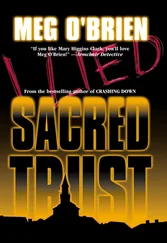“Have you read it?”
“No. But he is a good man, I swear.”
Now the chaperone has come up to them.
“How are you, dear sister?”
Zuana smiles. “Oh, very well, thank you, Suora Elena. Well, except for this sad news. This is Signora …Vesalio. Her husband was one of my father’s most talented students at the university. He is very sick and she has come to me for advice. But more than any remedy, I think, we must all pray for him.”
The sister stares at the woman, reading the humility in her dress as well as her face. “Rest assured, good woman, we shall add him to our prayers,” she says, smiling, and moves away.
Zuana keeps her head down, as if she is indeed in prayer. Opposite her, the woman holds her hands loosely clasped in her skirts. Under her palms Zuana sees the edge of the folded paper.
“Why me? Why do you come to me?”
“Because he said you were a kind and good nun.”
“He does not know me.”
“He seems to. And he was right. You are …kind and good. I wish I had known your father…” She trails off.
Zuana stares at her for a moment. Later she wonders when she made up her mind. Or perhaps she never did. Perhaps it was only her body that took the decision.
She moves her hands across the divide of their laps until they cover the woman’s own. She is pleased to note that their fingers are equally stained.
“Dear God, look down on Your servants here and help this young man back to health so that he may use his voice to praise You.” As Zuana says the words, the woman releases her grip on the letter and she takes it within her own fingers and holds it there.
“Amen.”
“Amen.”
Zuana pulls her hands back and folds her skirts around them. “You had better go now,” she says quietly.
“Thank you.”
The woman stands and moves swiftly away.
“Oh …Signora Vesalio.”
The woman turns.
“Tell your husband to try honey and cobwebs mixed with white of egg on the neck and face wounds. It will help to salve the scarring.”
Zuana does not immediately leave but sits, her hands folded over the letter, looking out over the room. She watches Suora Perseveranza, her body held upright to compensate for the belt around her middle, in animated conversation with a well-dressed married woman of similar age and features. At her feet a child, a sweet little girl with a mass of fair curls, is balanced against her knees, her mouth grubby with biscuit crumbs, her hand picking at the wooden rosary beads that hang from her aunt’s hips. How old is she, three? Four? Already too pretty to be the next nun of the family. But there is time yet. Come an attack of the pox or some disfiguring accident, or even a gradually perceived slowness of mind …
Zuana slips the letter up inside her wide sleeves and leaves the room and the sound of laughter behind her.
IN THE CHAPEL she takes her usual place in the empty choir stalls and sits, her heart pounding. She closes her eyes and feels the wood against her back, registers the cuts of the craftsman’s knife as a piece of walnut warehouse joins to a sliver of mahogany water. So much work here, so much devotion. After a while she opens her eyes to the frescoes on the walls around her. As it is wasteful to have candles burning during the day the chapel is illuminated only by the progression of natural light, so that different parts are highlighted at different times. For this reason the cusps of the seasons have always been special for Zuana, as from her place in the choir stalls the afternoon light then favors two particular scenes. Over the years she has come to know them very well. Now she uses them to help steady her mind.
In the first, Joseph and Mary are returning to Jerusalem after the birth of the Christ child. Mary rides a donkey while Joseph walks beside her. Baby Jesus, already a sturdy infant, sits astride His father’s shoulders, with His arms thrown out in joyful recognition toward His mother, His childish pleasure so far from the burdens of divinity yet to come. In contrast, the fresco to the side shows the cross on which He is to die, with a ladder leaning up against it and the figure of the adult Christ climbing—His step almost sprightly—up the rungs toward the lateral bar.
When Zuana first entered the convent, the novice mistress of the day had pointed out these two images as representative of the spirit of Santa Caterina: how they showed Our Lord reaching out first toward life and then death. Even then the art was old— over two hundred years—and considered special, she said, since they knew of no other convent where Christ was depicted giving Himself up for sacrifice in this manner. She had died a year later from the fever (it was before Zuana was allowed to treat patients), but her kindness and the power of the images had fused in Zuana’s memory and in times of crisis she has often found comfort being close to them. She sits and studies them now, the letter resting beneath her hands, a modest dot of scarlet wax sealing it shut.
So, Madonna Chiara’s family had taken care of the young man, had made sure that he did indeed disappear from the novice’s life. Dear God! But had they told her what they had done? Had the abbess known all along that instead of a post at Parma there was only the prospect of a corpse pumping blood from a dozen stab wounds into the river? No. Surely not. How could she have known? How could she possibly have condoned such a thing? Except …except that, in all of the abbess’s story, it had been the one event that didn’t make sense: why, after risking so much to be close to his love, he should suddenly choose to desert her.
Because such young men do not care a fig for anything but their own pleasure. If he had had his way he would have taken her and ruined her.
Is that what she truly believed? She, who has lived in the convent all her life, yet seems to know more about man than she does about God? Zuana sees her standing in the herb garden, her hands smoothing out the nonexistent creases in her robes. It is a gesture she knows well. But how well does she really know the abbess, this woman who has dedicated her life to the glory of God, the well-being of her convent, and the reputation of her family? Until, that is, one of those loyalties comes into conflict with another.
In the chapel, Zuana puts her head down and starts to pray
The afternoon light moves around her. Eventually she lifts her head, takes the letter in her hands, and breaks the seal.
• • •
IT IS ALMOST the end of visiting hour when she crosses the courtyard to the novice’s cell. By rights she should be studying or at prayer. Instead, she finds the girl lying on her bed, so deeply asleep that she does not even register her entrance. She is fully dressed, curled up like a small child, with a blanket pulled over her. Her face is pale, save for the lightly bruised skin under her eyes. The line of her chin is sharp now, the childish plumpness worn away. She will be feeling the cold, hence the body curled in on itself: before the spirit ignites its own fire, lack of food drains away the body’s warmth.
Under the bed Zuana notices a small bundle. She takes it out and unwraps it. A lump of bread sits inside. It is fresh, her daily portion from lunch, no doubt, concealed somehow in her robes. As her appointed spiritual guide, it is Suora Umiliana’s job to be monitoring her return from fasting to food now. Since there is no nun in the convent with a sharper eye for the infraction of rules, the very presence of the bread is evidence that Umiliana is encouraging the fast beyond the end of the penance. How convenient it would be for her if this sweetest of the sweet saved souls now became a conduit to God. Her very own young mystic.
Читать дальше












